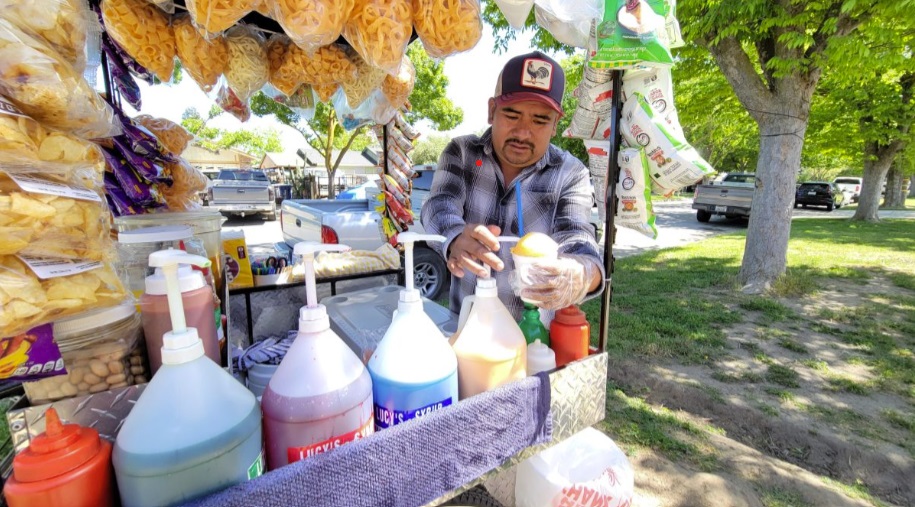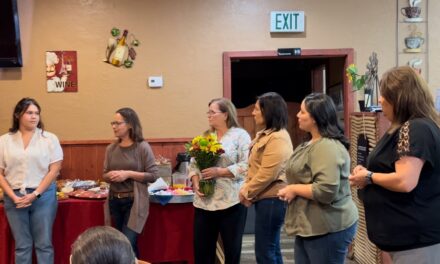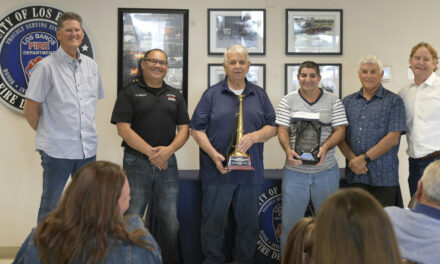By CHRISTIAN DE JESUS BETANCOURT
Central Valley News Collaborative
As scorching temperatures grip the Central Valley, parched residents seek solace from the relentless heat with cold, flavorful raspados — snow cones filled with sugary delights and bright, eye-catching colors offered by street vendors.
One example of a vendor of raspados is Alfonso Lopez, affectionately known as Don Lopez, around the south side of Merced.
“Pega fuerte el calor, pero tengo biles que pagar– the heat hits you hard, but I have bills to pay,” he said in Spanish.
Like many other migrant women and men, the 35-year-old is part of the informal economy of street vendors in the San Joaquin Valley, making a living by providing beloved street food to the community.
However, this job can be dangerous, as vendors like Lopez face risks such as robbery and violence.
His livelihood comes from an ingenious half-bicycle, half-metal box contraption adorned along the edges with bags of duritos—crispy, salty Mexican pinwheel snacks—potato chips, and various toys and candies, all available for sale.
At the heart of this mobile eatery is a pot brimming with corn on the cob, ready to be slathered in butter, mayonnaise and cheese – or served in a cup with a sprinkle of chili powder and lime.
A chest packed with ice promises refreshing snow cones, their bright syrups waiting to be drizzled over finely shaved ice.
This mobile storefront is more than a cart; it’s a hub of flavor and community, a testament to the ingenuity of street vendors and the rich culinary traditions they bring to the culture of California’s Central
For the past 12 years, Lopez has called Merced home, a city with a population of around 90,000 that pulsates with life—a stark contrast to his quiet hometown of Malvarisco, Oaxaca, Mexico, where only about 70 people reside.
“No hay nada allá, así que me vine a buscar suerte—there’s nothing out there, so I came out here to try my luck,” Lopez said. “I used to work the coffee fields out there and some cornfields.”
It took about seven years of saving and hard work before Lopez was able to bring his wife, Lupita and their children with him.
“The work in the fields would go up and down, and that’s why I’m out here doing my best,” he said. “Fieldwork is very taxing on the body and this allows me more freedom to be with my family.”
A typical day for Lopez begins at the crack of dawn. He rises early to attend to his three children – ages 7, 11, and 14 – helping them get dressed and ready for school before seeing them off for the day.
After dropping them off at school, Lopez’s day shifts gears as he heads to various local markets and stores, meticulously selecting fresh ingredients for his cart.
Once the shopping is complete, Lopez heads to a nearby restaurant, whose operators allow him to use their kitchen facilities to deep-fry the duritos, boil his corn, cut his limes, and prepare his sauce bottles, ensuring everything is ready for the day ahead.
Around noon, with his cart fully stocked and prepared, Lopez sets out into the streets. He strategically positions himself near a school, where children, finished with their classes for the day, eagerly flock to purchase his products beneath the shade of a nearby tree that serves as a respite from the scorching heat.
Once children leave or school is out of session, Lopez cycles through the streets and local parks, looking for customers to buy his goodies.
However, despite his meticulous planning and hard work, the street vending business is not without its challenges.
Rainy days keep customers indoors, reducing daily earnings significantly. Additionally, spoilage poses a constant threat, as any unsold or spoiled food directly impacts Lopez’s income.
“If the food gets wet, we have to throw it away,” he said.
Don Lopez’s wife Lupita, who operates a food cart of her own, is shown adding fresh tamarind to a raspado on a hot summer day in Merced, California. Photo by Christian De Jesus Betancourt/ The Merced FOCUS
Safety has become a paramount concern for Lopez, who has experienced firsthand the dangers of his trade in two separate incidents.
The first incident was three years ago, when, as he was riding on the streets, he was hit on the head from behind and his earnings were taken.
“I was on R and 2nd (streets) when two people came towards me,” Lopez said. “They asked me to grab a bag of duritos for them, and when I did, they hit me from behind and got on top of me. If it wasn’t for two ladies that yelled at them, I don’t know what would have happened.”
The second time, in April of this year, left him shaken as the harrowing experience made him think he could lose his life over a couple of hundred dollars and a cell phone.
“I was on Q and 3rd Street when two masked men came toward me,” Lopez said. “As they got closer, they pulled a gun and held it against my head. They pushed me around and took all my money, $200, all my earnings for the day.”
The assailants took off running to a nearby parking lot, where they got into a car and sped away. An onlooker went to Lopez’s aid and lent him a phone to call the authorities.
He waited for more than an hour until police arrived. The officers took his statement and photographed his temple, where the barrel of a gun left a red mark.
“By the time I was done with it all, it was time to go home,” he said. “I got on my cart and rode it back with nothing to show for a full day’s work. It took me two to three days to feel safe enough to go out again.”
His wife, Lupita, who operates her own cart, has also encountered dangers while working on the streets to make a living.
“When I was working by 8th Street, they pulled a knife on me,” she said. “They told me that if I didn’t give them the money, they were going to stab me. It’s sad because you work hard all day to make $30-40 just for some crooks to take it from you.”
When asked about his hopes and desires, Lopez said he hoped to be able to sell more for his children. “I want my children to get ahead,” he said. “I don’t want them to deal with the dangers of the street. I want them to go to school and have careers.”




